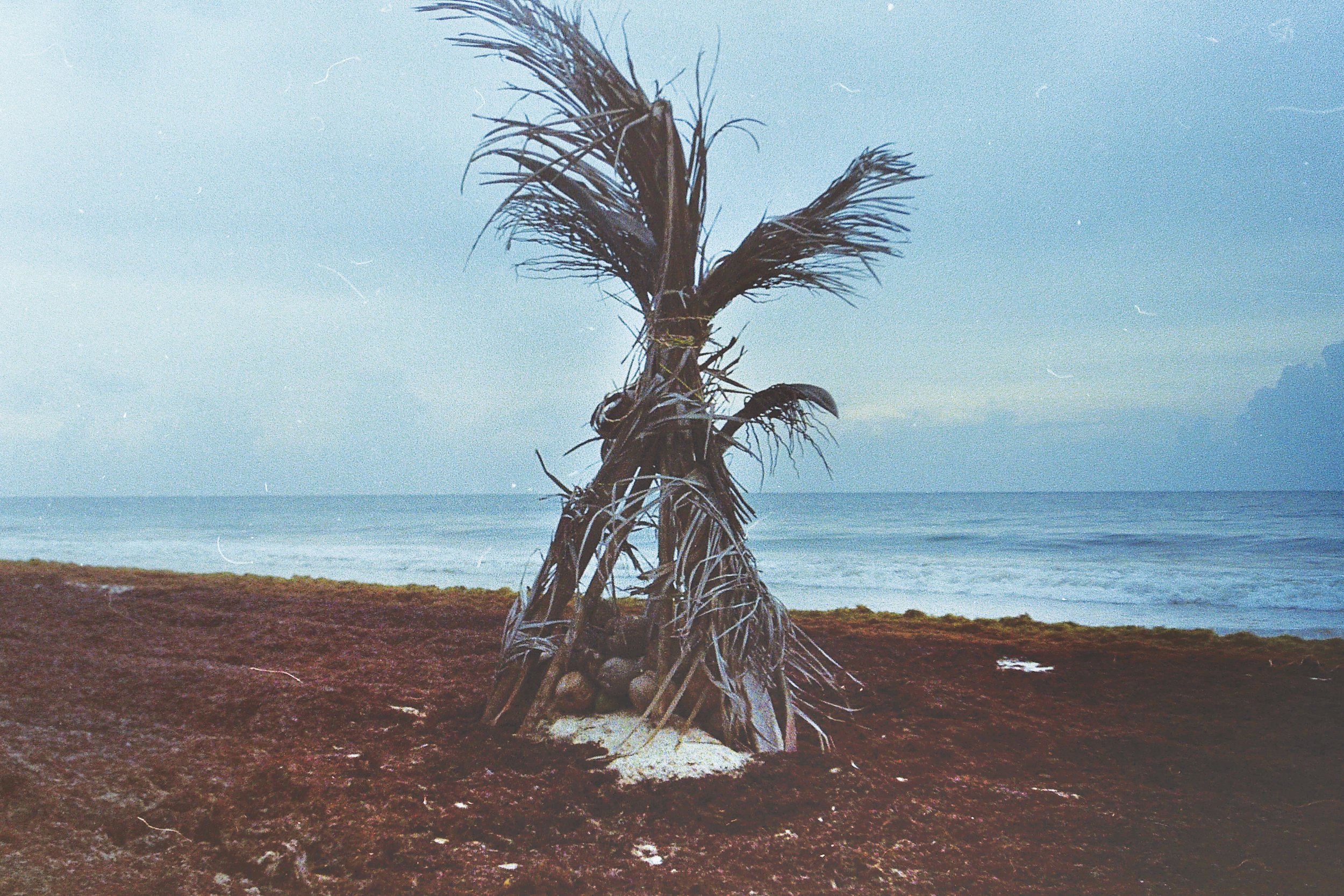A totem for Quintana Roo, mix media, 2019, Mexico
Snipet from I am not here. Premonitions of a Nomadic art
A type of totem
The Emergence-Totem is an interlocutor that appears wherever a State apparatus coerces; a Totem can be erected wherever there are agents without a voice, but always momentarily.
Of all the plagues brought by the British Petroleum* oil spill in the Gulf of Mexico in 2010 – the biggest on record – there is one that is growing continuously in the margins. The authorities have for years failed to provide explanations, let alone solutions. The issue has been conveniently forgotten. Instead, there is a climate of silence where national, state and county governments, resorts, hotels, cruise ships and timeshares have plotted together to avoid drawing much attention.
Sargasso is a seaweed, which they say originates in the ocean between Brazil and Africa, that floats thanks to lobes full of gas. It feeds off microorganisms and nutrients that float in the water. If there is more of it, then it is because there has been an increase in nutrients, which isn’t as good as it sounds. Apparently one of these microbes, the existence of which makes it possible for the Sargasso to increase exponentially, is used to clear up oil spills. Since it consumes crude oil and the microbe thrives in cold water, it could have adapted to Mayan sea temperatures over time, as a result of natural oil leaks and filtrations. Yet again, we find ourselves blood brothers with the plagues that Progress unleashes upon itself: an organism that tries to stay afloat by eating fossil fuels and being washed across the surface of the planet. It sounds kind of familiar.
[A disturbing proposition: if toy dinosaurs are made of plastic, and plastic is a derivative of oil, which forms when those huge animals decompose, then that means that toy dinosaurs are made of real dinosaurs!].
Sargasso seaweed has proliferated way beyond predicted limits and is now a threat to local ecosystems and to the human ways of life that depend on the quality of the famous crystal clear waters of the Caribbean, the picture postcard Mayan Riviera. The seaweed not only ruins the experience of going into the sea, but also accumulates on the shore and forms putrid mats measuring about thirty or forty centimetres deep with a foul odour. It is well known that the Gulf of Mexico is an area where sea turtles lay their eggs and rest, and the problem is that the seaweed works equally well as a natural net to catch the oil as it does to catch the baby turtles trying to reach the sea once they have hatched from their eggs.
Arrogance and disaster, fixing in order to break and breaking in order to fix, the issue here is not only that holidays have been ruined, but that an entire ecosystem has been doomed. Our good friends over at British Petroleum have spent more money bribing the press and tricking search algorithms than they have in effectively cleaning up the damage they caused. The tourists are demanding to be reimbursed for the cost of their trip and for the companies to stop using photos from 8 years ago. Meanwhile the turtles and fish are asking for the disaster, and the so-called solution, to be cleaned up. Here, everything smells fishy. Here, a Totem is raised.
* British Petroleum (BP), formerly known as the Anglo-Persian Oil Company, is the British oil company whose spill is a mirror for the 20th Century. At its inception, it invented the idea that transnational capitalism is a game played from inside the company. They realised that the Persian Gulf is the biggest (traditional) crude oil reserve on the planet. Winston Churchill was among its members, and acted as the lobbyist who catapulted the company towards exclusive control of the region. For their part, the Iranians, tired of seeing the money flow elsewhere, decided to nationalize the resource and managed to do so briefly in the middle of 1950. Three years later, the CIA and MI6 organized a military coup that brought everything back to normality until the oil crisis, but this footnote is becoming rather long.

